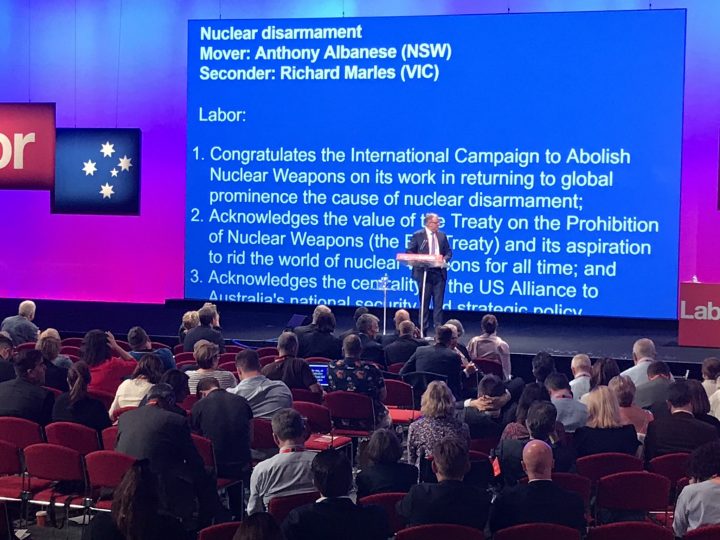The International Campaign to Abolish Nuclear Weapons (ICAN) Australia applauds the Australian Labor Party for committing today to sign and ratify the UN Treaty on the Prohibition of Nuclear Weapons. The party is widely expected to win government in 2019.
“This is a major breakthrough that heralds a more constructive Australian approach to nuclear disarmament. The treaty is our best hope for making meaningful progress in eliminating the world’s worst weapons,” said Gem Romuld, director of ICAN Australia.
“The current government has opposed this treaty based on its misguided belief that US nuclear weapons keep us safe. But we are confident that the next government will stand on the right side of history by joining the treaty,” she said.
“For most Australians, this is a no-brainer. Nuclear weapons are never an acceptable means of defence. This is the next step in nuclear disarmament, entirely compatible with the nuclear Non-Proliferation Treaty and the US Alliance. Australia has taken a firm humanitarian stand against landmines and chemical weapons. Now we must do the same for the most indiscriminate and destructive weapons of all,” said Romuld.
Karina Lester, Yankunytjatjara-Anangu second-generation nuclear test survivor, said: “My homelands were poisoned by nuclear weapons testing and decades later, we are still feeling the impacts. Labor’s commitment is an important step forward in ensuring no one ever has to suffer under the mushroom cloud again.”
Tim Wright, treaty coordinator of ICAN, said: “This commitment reflects the deep concern of many Australians at the growing risk of nuclear weapons use. More than ever, our security depends on an effective rules-based international order and strong multilateral institutions.
“Labor leader Bill Shorten has pledged to pursue a more independent foreign policy. Joining the nuclear weapons ban treaty will be an essential element of that policy,” he said.
Since the treaty was adopted in July 2017, 78 per cent of federal Labor parliamentarians have pledged to work for Australia’s signature and ratification of the landmark agreement. Their endorsement built momentum for today’s platform commitment.
The trade union movement has also rallied behind the treaty. They include the Australian Council of Trade Unions, Australian Manufacturing Workers’ Union, Australian Nursing and Midwifery Federation, Maritime Union of Australia, Australian Services Union, Community and Public Sector Union, and Health Services Union.
Other influential supporters include Australian Red Cross, the Australian Medical Association, the National Council of Churches, the Royal Australasian College of Physicians, and major environmental and humanitarian organisations. An Ipsos poll in November showed that 83 per cent of Labor voters want the next Labor government to sign up to the treaty.
Most of Australia’s neighbours, including Indonesia, New Zealand, Malaysia, the Philippines, Thailand and Vietnam, have already signed the treaty. Pacific nations – some of which have suffered the effects of nuclear testing – have been among the fastest to ratify the treaty.
Text of the new Labor platform
Labor in government will sign and ratify the Treaty [on the Prohibition of Nuclear Weapons], after taking account of the need to:
– Ensure an effective verification and enforcement architecture;
– Ensure the interaction of the Ban Treaty with the longstanding Nuclear Non-Proliferation Treaty;
– Work to achieve universal support for the Ban Treaty.










